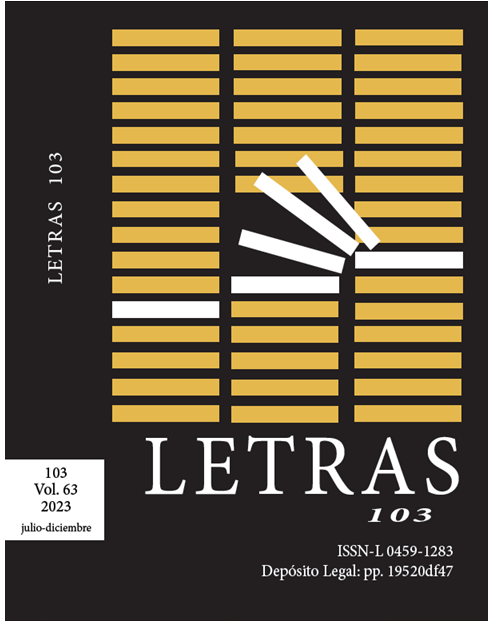Literary dystopia as a modern artifact
DOI:
https://doi.org/10.56219/letras.v63i103.2366Keywords:
dystopian novels, modern theory, modernity, dystopian genreAbstract
This article studies the dystopian novels Brave New World, 1984, Fahrenheit 451 and The Handmaid's Tale within the modern theory (Bauman, Habermas) that argues that modernity has not ended and that changes can be made within it, but not its complete closure. This approach to modernity fits with the findings of different characteristics between the dystopian genre in the phase of modernity that followed the Industrial Revolution and the one that boomed in late modernity. The method used to support this work consists of a comparative exercise between the first two novels mentioned above and the last one, based on the intuition that the different moments in which they were written imprint them with contrasts marked by the different stages of modernity.
Downloads
References
Aron, R. (2007). Ensayo sobre las libertades. Madrid: Alianza Editorial.
Atwood, M. (2021). El cuento de la criada. Barcelona: Salamandra Bolsillo.
Atwood, M. (10 de marzo de 2017). “Margaret Atwood on What ‘The Handmaid’s Tale’ Means in the Age of Trump”. En The New York Times. https://www.nytimes.com/2017/03/10/books/review/margaret-atwood-handmaids-tale-age-of-trump.html?_r=0 [Consulta: diciembre de 2022].
Báez, F. (18 de febrero de 2017). “George Orwell en tiempos de Trump”. En El Español. http://www.elespanol.com/opinion/tribunas/20170217/194600542_12.html [Consulta: diciembre de 2022].
Bauman, Z. (2003). Modernidad líquida. Buenos Aires: Fondo de Cultura Económica.
Bradbury, R. (2015). Fahrenheit 451. Caracas: Editorial Planeta.
Eco, U. (22 de junio de 1995). “Ur-Fascism”. En The New York Review of Books. http://www.nybooks.com/articles/1995/06/22/ur-fascism/ [Consulta: diciembre de 2022].
Geli, C. (9 de febrero de 2016). “El Biblioteca Breve premia una distopía que prevé la caída del sistema”. En El País. http://cultura.elpais.com/cultura/2016/02/09/actualidad/1455020095_024310.html [Consulta: diciembre de 2022].
Han, B. (2015a). The burnout society. Stanford: Stanford University Press.
______ (2015b). The transparency society. Stanford: Stanford University Press.
Huxley, A. (1985). Un mundo feliz. Nueva visita a un mundo feliz. Barcelona: Edhasa.
Huxley, A. (2009). Un mundo feliz. Bogotá: Debolsillo.
Inglehart, R. (2001). Modernización y posmodernización. El cambio cultural, económico y político en 43 sociedades. Madrid: Centro de Investigaciones Sociológicas en coedición con Siglo XXI. (Reimpresión de la primera edición de 2000).
Manguel, A. (1999). Una historia de la lectura. Bogotá: Editorial Norma.
Mannheim, K. (1987). Ideología y utopía. México D.F.: Fondo de Cultura Económica.
Marín, P. (2 de enero de 2013). “Roger Chartier: ‘Históricamente no ha habido una revolución en la lectura semejante a la digital’”. En La Tercera. http://www.latercera.com/noticia/roger-chartier-historicamente-no-ha-habido-una-revolucion-en-la-lectura-semejante-a-la-digital/ [Consulta: diciembre de 2022].
Neusüss, A. (1971). Dificultades de una sociología del pensamiento utópico. En A. Neusüss (Ed.) Utopía. Barcelona: Barral Editores.
Orwell, G. (2006). 1984. Madrid: Mestas Ediciones.
Popper, K. (2013). The open society and ist enemies. Princeton/Oxford: Princeton University Press. (Nueva edición en un solo volumen).
_________ (1971). Utopía y violencia. En A. Neusüss (Ed.) Utopía. Barcelona: Barral Editores.
Ritzer, G. (2003). Teoría sociológica contemporánea. México, D.F.: McGraw Hill.
________ (2003). Teoría sociológica moderna. Madrid: McGraw Hill.
Sartori, G. (1998). Homo videns. La sociedad teledirigida. Buenos Aires: Taurus.
Steiner, G. (2007). Los logócratas. México, D.F.: Fondo de Cultura Económica, Ediciones Siruela.
Žižek, S. (31 de octubre de 2016). “Después del fin de la historia”. En El País. http://cultura.elpais.com/cultura/2016/10/20/babelia/1476976602_505346.html [Consulta: diciembre de 2022].
Published
How to Cite
Issue
Section
License
Copyright (c) 2023 LETRAS

This work is licensed under a Creative Commons Attribution-NonCommercial-ShareAlike 4.0 International License.
Letras magazine retains the patrimonial rights (copyright) of the published works, which favors and allows their reuse under the license (CC BY - NC - SA 4.0), for which they can be copied, used, disseminated, transmitted and expose publicly, as long as the authorship and original source of its publication (magazine, publisher, URL and DOI of the work) is cited, they are not used for commercial or onerous purposes and the existence and specifications of this use license are mentioned.















